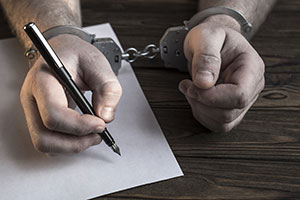False confessions expert Alan Hirsch offered testimony for the defense in the murder trial of Bobby Griffin Jr.
The Crime
On October 14, 2013, Nathaniel Bradley was fatally shot as he stood outside his car in New Haven, Connecticut. Bobby Griffin Jr. was charged with felony murder, murder, attempted first-degree robbery, and conspiracy to commit first-degree robbery in connection with Bradley’s death.
While Griffin initially admitted to murdering Bradley, he later claimed that he was coerced into confessing by the police who interrogated him. Griffin now claims that he was present for the crime but another man was the shooter.
The Trial
Griffin’s attorneys argued that the jury should hear about false confessions because the police detectives coerced Griffin into falsely confessing that he shot Nathaniel Bradley.
Griffin’s attorney presented Williams College professor Alan Hirsch to testify as a false confessions expert. Prosecutors Sean McGuinness and John P. Doyle Jr. objected to Hirsch’s testimony. McGuinness claimed that Hirsch was unqualified because he is an academic and does not have experience participating in interrogations. McGuinness also argued that the testimony would be prejudicial.
Superior Court Judge Elpedio N. Vitale held a hearing to determine whether Hirsch should be allowed to testify. Hirsch cited statistics from the Innocence Project, an organization that works to exonerate the wrongly convicted. Hirsch testified that “They found that hundreds of people had been wrongly convicted and about one-quarter of them had confessed.”
Hirsch described the Reid technique, which is a commonly used police interrogation tactic. Hirsch explained that the nine-step process uses confrontation and minimalization to break suspects down. Utilizing this technique, “The suspect is told confession is the only way out and it’s not a particularly bad way out.” Hirsch said that the problem with the Reid technique is that it breaks down the innocent as well as the guilty.
Griffin’s attorneys argued that during Griffin’s 3-4 hour interrogation, the detectives lied to him about the evidence against him and told him he needed to confess. Detective David Zaweski acknowledged that he and Detective Nicole Natale lied about the evidence they had.
Griffin acknowledged that he read and signed a Miranda form advising him that he had the right to remain silent and to have an attorney present. He also admitted that the detectives told him that he could stop the questioning at any time. However, Griffin also said that he felt pressure from the detectives. “I thought I had no choice. They kept telling me I did it. I kept saying I had nothing to do with the crime.”
Judge Vitale decided that Hirsch would be allowed to testify, but only generally. Hirsch would be allowed to testify about the techniques of confrontation and minimalization, but would not be allowed to specifically discuss the interrogation of Griffin and his confession.
During his testimony in front of the jury, Hirsch explained that aggressive police questioning sometimes causes a suspect to confess to a crime they did not commit.
Verdict
Jurors found Griffin guilty of murder. He will be sentenced in May.




